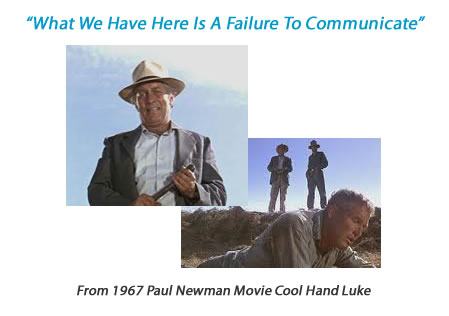One of the biggest problems with health care today is that there is way too much information and way too little communication going on between providers and patients.
Here’s a great quote that explains what I mean:
One of the biggest problems with health care today is that there is way too much information and way too little communication going on between providers and patients.
Here’s a great quote that explains what I mean:
The two words information and communication are often used interchangeably, but they signify quite different things. Information is giving out; communication is getting through.
Sydney Harris, Journalist
 I was reminded of this and the quote from “Cool Hand Luke” in an exchange I had with a primary care physician on LinkedIn recently. In that exchange, which dealt with long-term physician-patient relationships, I hypothesized that intentional non-adherence may be the by-product of situations in which physicians and patients in long-term relationships simply grow to distrust each other.
I was reminded of this and the quote from “Cool Hand Luke” in an exchange I had with a primary care physician on LinkedIn recently. In that exchange, which dealt with long-term physician-patient relationships, I hypothesized that intentional non-adherence may be the by-product of situations in which physicians and patients in long-term relationships simply grow to distrust each other.
The good doctor commented as follows:
“In the end, it is the patient’s decision to be compliant or not, yet many physicians continue to care for these patients because someone must. Would the patient comply better with a new doctor? I doubt it. “
I replied to the good doctor’s comment as follows:
“True…the decision to comply or not is up to patients. But the evidence shows that compliance is not a product simply of bad patient behavior. Non-compliance is an outcome for which both physician and patient have shared responsibility.
I suggest that most people would be a lot more likely to comply if they: 1) understood and agreed with the need for the prescription and 2) believed that the benefits of taking the medication outweighed the risks and concerns. But these issues are seldom brought up by the physician or the patient, due to limited time, provider attitudes and beliefs about patient, and so on.”
Then he dropped the A-bomb – a move intended to silence anyone who would dare challenge physician authority and learnedness:
A professional who deals with this on a daily basis can explain meds, conditions, etc. very quickly and to the satisfaction of the patient.
That’s when it occurred to me…too much information and not enough communication
No doubt most providers today are proficient at quickly giving information to patients (including telling them what to do). What most providers (and people in general) are not good at is effectively communicating, e.g., getting through, with patients (or each other). Anyone who has ever been married knows the difference between information giving and communicating.
And how would the good doctor know that his patients understood the information he gave them…not to mention their being satisfied with it? Surely he’s not banking his revenue going forward under P4P on his patient satisfaction surveys alone.
If anything, the weight of evidence suggests that his patients probably do not understand the information he quickly doles out and probably are not particularly satisfied with it. Like many of us, his patients probably do not want to confront the good doctor choosing instead to ignore his recommendations or seek advice elsewhere, e.g., non-adherence.
But as with any good relationship, effective spouse-centered (I mean patient-centered) communications is key. To truly engage the other party, you have to know where they are coming from, what’s important to them and never, never ask them to do more than they are willing and able to do. I had to say that since my wife proof reads my blog posts…lol).
That’s what I think…what’s your opinion?







